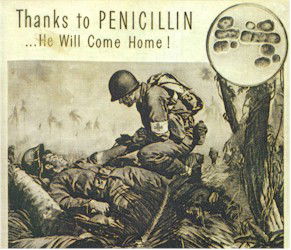Medical Innovations

Penicillin was called a Miracle by many, as it had the power to kill some diseases caused by bacteria. Soldiers would often get diseases, and those diseases spread quickly in the trenches. Penicillin enabled soldiers to continue fighting and survive disease. After the bombing of Pearl Harbor (when the United States entered the war), the demand for penicillin was so high that the antibiotic had to be mass-produced.
Click here to learn more about the history of penicillin and its discovery.
Blood Transfusions
Blood transfusions were also very important in WWII. When soldiers would get hit by bullets, they would lose a lot of blood needed to receive more. The use of blood transfusions and plasma allowed soldiers to gain the blood they lost. This saved many lives in the war and reduced the number of casualties greatly.
Click here to view a timeline of how the blood transfusion advanced overtime.
Finding the Cure for Malaria
Malaria proved to be a huge problem in WWII. The disease is caused by a special species of Plasmodium. It is transmitted by a female Anopheles mosquito. The disease was spreading rapidly in the trenches during the war, and countries were desperate to find a cure for it. Toward the end of 1943, it was discovered that the German medicine atabrine could cure a type of malaria called falciparum malaria. However, troops were still dying from the disease. Scientists still searched for a cure and in early 1945, a medicine called chloroquine was discovered to cure falciparum malaria and another type of malaria called viva malaria, proving to be a successful cure for malaria.
More Medicines
Click here to learn about the medicines used before WWII.
